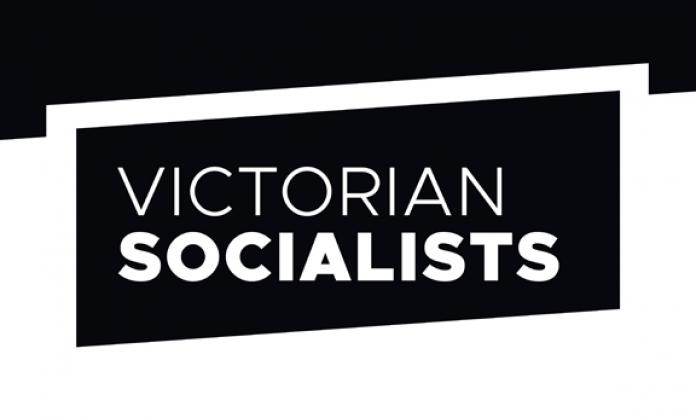For the last two months, hundreds of socialist activists have been pounding the pavements of Melbourne’s northern suburbs – knocking on doors, handing out leaflets at train stations and shopping centres, putting up posters and letterboxing homes.
There hasn’t been a socialist electoral campaign on this scale in Australia in living memory. The upper house electorate we were contesting, Northern Metropolitan, is huge – its half a million voters make up more than one-fifth of voters in metropolitan Melbourne. But the campaign was equal to a challenge of that scale.
In eight weeks, 95,000 doors were knocked, 300,000 homes were letterboxed and 15,000 posters were put up. Commuters at every train station in the northern suburbs were repeatedly leafleted by Victorian Socialists campaigners.
During the early voting period, Victorian Socialists campaigners outnumbered all other parties at many of the outer northern suburbs early voting centres, and we came close to matching Labor and the Greens in the hotly contested inner city booths. On election day, 700 volunteers helped staff the 154 polling booths across the Northern Metropolitan region.
It was by any measure an extraordinary grassroots mobilisation for a small political party that was registered only in June this year. There is no shortage of small parties contesting Victorian elections these days – 18 appeared on the Legislative Council ballot paper. But most of these are shell outfits, hoping to wheel and deal their way into parliament through unscrupulous preference deals that allow them to avoid the hard work of going out and convincing people to vote for them.
Our campaign was completely different. We were in it to win it, but we didn’t even contemplate trying to win through dodgy preference deals that could elect right wingers on the back of our votes. We are the only party – major, minor or micro – which can say that.
Instead, we tried something completely different – getting out on the streets day after day, talking to people and convincing them to vote for us.
When polls closed at 6pm on Saturday night, we knew we had run an extraordinary campaign. What we didn’t know was what the superhuman efforts of our volunteers would translate to in terms of a socialist vote.
We felt our arguments had connected with a lot of people. But we also knew that we were up against it on many fronts. Most of the people we spoke to had never heard of us before we knocked on their door. Labor and the Greens have long histories and brand recognition. Flipping some of their supporters to vote socialist was never going to be easy, even if people liked what we had to say.
And for the many people completely disillusioned with politics, it was always going to be hard to convince them that we were not just another bunch of cynical political operators who couldn’t be trusted.
Added to that, getting a vote for an openly socialist ticket has proven tough in Australia. Most recent socialist electoral efforts have been lucky to get 1 percent of the vote. In many cases they have done much worse. There is not an easy vote for socialism the way there is for vacuous parties like “Aussie Battler” or “Local Jobs” that can pick up a protest vote without much effort.
So as we waited for the first numbers to come in, we were readying ourselves for anything. We knew we would do reasonably in Richmond, where our lead candidate Steve Jolly has won a huge and almost unprecedented number of votes for an open socialist in recent state elections.
Beyond that, we really had no idea. We had no polling or focus groups. We had no institutional knowledge. We only had a hunch that we had connected with a few people.
Some of the earliest results came in from the lower house count in the Mill Park district. We were tracking above 4 percent – a huge result for a place where there has never been a serious socialist campaign, and where we had hardly doorknocked. A real sign of hope.
Then we got the results from a booth in the seat of Broadmeadows, Coolaroo: we had achieved 9.2 percent of the primary vote. Other Broadmeadows booths came in soon after – Meadow Heights, one of the most neglected areas of Broadmeadows, 11.6 percent. Fawkner, 10.6 percent. They weren’t all as good as that, but by the end of the night we were sitting on 8 percent of the vote in Broadmeadows, probably the most marginalised, racially and culturally diverse working class electorate in Victoria.
Results from Thomastown, Yuroke (Craigieburn) and elsewhere across the north were not on the scale of what we achieved in Broadmeadows, but were still in the 3-4 percent range, which is a huge achievement for a socialist movement that has for far too long been cut off from any influence in the core working class areas of Melbourne.
Then the upper house count from polling day in the inner city (where we did not contest the lower house seats) began to come in. 9.8 percent in Richmond. 7.2 percent in Northcote. 6.3 percent in Brunswick. Extraordinary numbers when you take into account that these inner city seats are hotly contested battlegrounds between Labor and the Greens.
When we launched this campaign, we knew that, from a standing start, with no infrastructure, no brand recognition, and no way of proving that our candidates would do what they said if elected, it would be extremely difficult to get a high socialist vote across such a vast electorate as Northern Metropolitan.
But we were also confident that socialist politics could resonate in both the liberal inner city, and in the blue collar working class areas of Melbourne’s north.
Our vote has vindicated this confidence. We have won voters away from Labor in the northern suburbs and also polled well in the inner city, where Labor and the Greens assumed that between them they had a monopoly on the left wing vote.
Over the past few years, the Greens have increasingly retreated to becoming a party of the liberal inner city middle classes – the “woke bourgeoisie” as one former Green and now Victorian Socialist member put it in Overland. They are incapable, even if they were interested, of challenging Labor in its heartlands.
The ALP, on the other hand, takes its voters in the working class suburbs entirely for granted – confident (probably rightly) that neither the Greens nor the Liberals can ever gain a presence there that will threaten them. At the same time, they try to hold off the Greens in the inner city by claiming that only Labor can enact a socially progressive policy agenda.
Neither Labor nor the Greens provide a way forward for the left.
Labor trades on its links with the union movement to claim that it stands for workers, but in practice it has, by the most charitable assessment, completely failed to reverse the privatisation and deregulation of the Kennett era. At the same time, it goes along with almost all the right wing scaremongering about refugees and migrants. At a federal level, it is in lock step with the Coalition on all issues to do with race, immigration and national security.
The Greens put forward progressive policies on race, immigration and inequality, but do so in a way that wins them some votes in the gentrified inner city, but is almost guaranteed to alienate working class voters. For the Greens, progressive politics is about empowering the already empowered to take a moral stand – whether that be about racism, sexism or even sometimes economic inequality.
The Greens say racism is terrible. We agree. But if you want to fight racist attitudes in the working class, you have to start by explaining how racism is a tool of the rich, used to divide people who should unite to fight their common enemy. Where the Greens say: “racism is terrible”, Victorian Socialists say: “no refugee ever cut my penalty rates”.
The vote count is still going, and we don’t know exactly where we will end up. At time of writing Victorian Socialists are sitting on 4.47 percent of the vote across Northern Metropolitan. Absentee votes, which because we are a new, relatively unknown party will probably be low, are still to come, as is most of the pre-poll vote. But it is likely we will end up somewhere between 4 and 5 percent overall, a remarkable achievement for a first attempt.
Victorian Socialists are, sadly, unlikely to win a seat this time. The micro-party and right wing preference wheels were always going to work against us. And even though we did extremely well on the first preference vote, the fact that both Labor and the Greens – the only two parties who did preference us – are sitting just below a quota in the fight for the last two spots, means we are probably not going to be able to secure a seat. If we had achieved this result in other electorates, for example Western Victoria or Western Metropolitan, we would almost certainly have been elected on Greens and/or Labor preferences.
But even if we don’t win, we have planted a flag. We are a new socialist electoral force that has proven we can win votes. We are not the inner-city-centred Greens, whose “progressivism” stops at Bell Street, and who haven’t even heard of the Ring Road. We are not the ALP, which treats its working class base with contempt. We are not wanna-be politicians. We want to tear the political status quo apart. We want a new politics that is about standing up for working class communities.
If you are one of our opponents who hoped we were just a one time thing, think again. And if you are one of those people who hoped we’d be more than that, now is the time to get on board. We are only just getting started.









